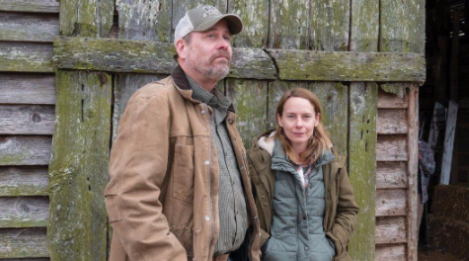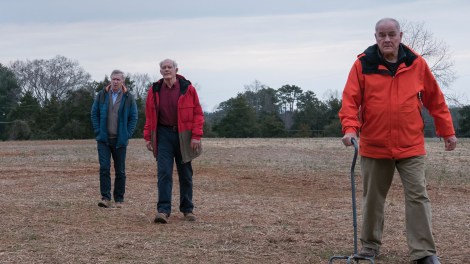Directed and Written by: Angus MacLachlan
Starring: Amy Ryan, Terry Kinney, Max Gail, Francis Guinan, Steve Coulter
Produced by: Angus MacLachlan, Kate Churchill
Executive Produced by: Martin Scorsese, Jeanne Hagerty
Music by: Jeffrey Dean Foster
Cinematography by: Andrew Reed
Editing by: Michael R. Miller
Winner – Best Screenplay for a U.S. Narrative Feature, 2017 Tribeca Film Festival

The presence of two of the country’s greatest actors notwithstanding, Abundant Acreage Available is a cruel psychological double-dare: go ahead, use the toilet or check your phone, and see if you can still comprehend the full picture.
Operating as it does at a mule’s pace, Angus MacLachlan’s second feature as writer-director (after his Tribeca-debuted Goodbye to All That, with the great Paul Schneider) displays absolutely no interest in being lumped in with mass entertainment. It prefers, like all self-important art, to be contemplated, debated, and perhaps even sneered at by the hoi-polloi for its impenetrability. Only the right kind of people are supposed to appreciate this kind of cinema.
What kind of cinema is that, exactly? Well, the new film, which comes from executive producer Martin Scorsese, is a pentagonal character study set on a modest farm in East Bend, NC. The land belongs to Tracy (Amy Ryan) and Jesse (Terry Kinney), siblings whose father, Bud, has passed away but moments before MacLachlan’s story starts.
Jesse is a former drug addict who, after a devastating tragedy, went the path of least resistance: towards unimpeachable faith in Jesus Christ. Tracy, by contrast, is sharp, a cynic who tolerates her brother’s religious delusions with a rueful smirk.
In their devotion to the family tobacco harvest, neither character has spent much time with the local folk, so it’s a cruel shock when Tracy discovers a trio of gray-haired brothers camping out on her property one morning.

Are these the Three Wise Men of yore, come to give these kindly people some relief from their painful lives? Or are they con men with agendas, looking to poach the land from Bud’s vulnerable offspring?
MacLachlan casts three capably blank players – Max Gail, Steve Coulter, and Francis Guinan, with nearly 300 film and television credits between them – as the brothers, who hold a suspicious connection to the land. Without our ability to associate the actors with any particular stock character roles, we remain uncertain of their motives.
Yet MacLachlan’s script contains no traditional thrills, and the frantic confusion brought on by the campers’ arrival is ultimately mitigated by a double-powered deus ex machina that requires of the audience an equally strong ability to suspend its disbelief.
In the right context, MacLachlan has made such contrivances seem both novel and ordinary, as he did to wrenching effect in his script for Junebug. That film, too, staged theatrical familial microdramas within a working-class North Carolinian milieu, and relied almost entirely on the malleable, pained features of actors like Scott Wilson, Celia Weston, and Amy Adams, who was nominated for an Academy Award for her role.
History may repeat itself. As Tracy, Amy Ryan reinforces her position as one of the most versatile actors we have, giving a contained, earthy performance quite worthy of a nomination.
It has been pointed out elsewhere that MacLachlan and cinematographer Andrew Reed pay particular attention here to her cheekbones, which tell most of the story in magic hour half-portraits. Tracy’s face is quicksilver, shifting from laughter to misery in the split seconds between shots, and Reed gives those moments beautiful clarity.
Ryan’s role, however, is not showy in the way Oscar prognosticators like (she cries a lot, but no snot); Kinney’s is the more bombastic, and the theatre legend invests it with the earnestly ignorant denialism of a True Believer.
Kinney, shockingly, has never won a major accolade for his acting – not even a Tony. Jesse is certainly a juicy enough role to break that streak, should Gravitas Ventures choose to put Kinney, a beloved actor’s actor, on the awards trail following the film’s theatrical release on Sept. 29.
Such a campaign will inevitably focus entirely on the splendid performers, as much out of respect for them as out of the recognition that the film does not live up to their talents. Like last year’s taxing Fences, MacLachlan’s script is talky and stagey in an exhausting way, creating a theatrical hyperrealism more palatable in a handsomely stark one-act play.
There are only two locations – inside the family house, and outside it, on the farm – and unusually for a film so reliant on place, both settings lack definition or character.
In production designer Lisa Myers’s and set decorator Teresa Strebler’s hands, the house itself is neocolonial, possibly the site of a former plantation (a fact which leads Jesse to view it as someone else’s than his own). Yet personal accoutrements like family photographs, tchotchkes, and cell phones are inexplicably absent; there’s not even a nice thermos between Tracy and Jesse, who have supposedly lived there from childhood to middle age. Theirs is a house, but not a true home.
Tere Duncan also opts for a wide ethnographic authenticity over personality in her costume design. Kinney’s Jesse, for example, adds the same baseball cap to every blandly colored Carhartt outfit, the same warm-weather apparel on view in recent releases like Wind River and Logan Lucky. The suggestion, of course, is that Jesse must also have a John Deere tractor and a Chevy Four-Wheeler just out of sight, being that he’s a modest tar heel.
Why the filmmakers did not consider the possibility that someone as religious as Jesse might have a pocket bible on hand, or crucifixes around the house, or that Tracy might have preferred something besides an unlabeled box in which to bury her father, is beyond me. Perhaps specificity was sacrificed for reasons budgetary, creative, or both, the details losing priority to the general execution of MacLachlan’s dialogue.
Unfortunately, what MacLachlan the screenwriter values compromises what MacLachlan the director and producer (with Kate Churchill and the line producer Jennifer Haire) most direly lack: narrative dynamism, energy, and vitality.
It’s the rare Martin Scorsese production that feels like a slog (even Silence had moments of walloping power), but Abundant Acreage Available moves so sluggishly through its five-point conversations that the only relief comes from metaphorical bird noises heard over the soundtrack. “Finally,” you think, “some life.”

Abundant Acreage Available hits theaters on September 29.
